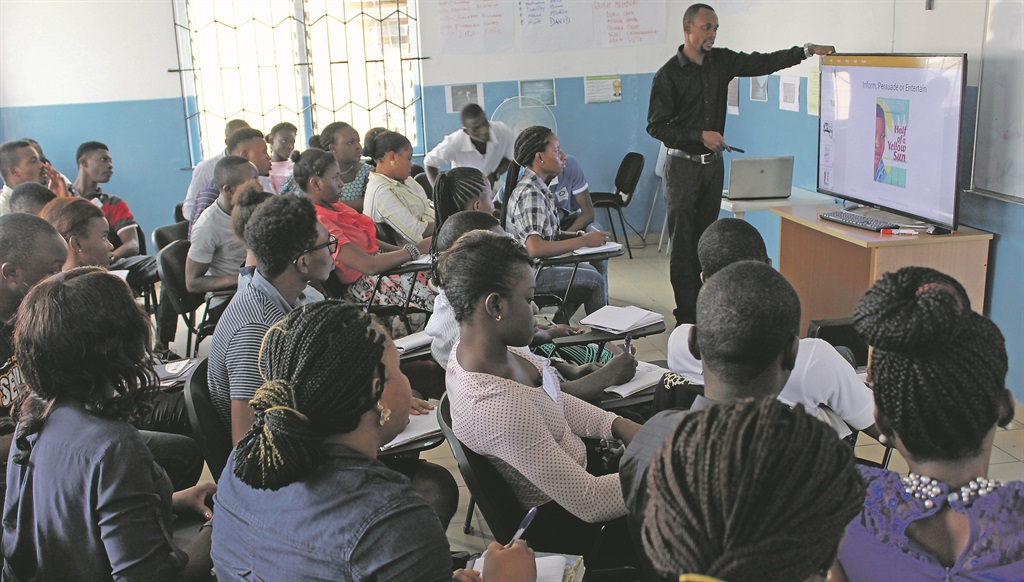
Godwin Udobassey is one of the 435 people to date who have benefited from West Africa Vocational Education (Wave), a pioneering social enterprise.
Udobassey was doing casual work for a security company when he applied to Wave because he wanted to acquire more skills and get a steady job.
Three weeks after graduation from the programme, Udobassey got a job with the Orchid Bistro Restaurant as a waiter.
“The systems thinking I learnt from Wave has helped me to discover errors in my workplace before anyone else within my department,” he said.
More than 40 million west African youth are chronically disconnected from the formal economy because they lack academic qualifications, skills and experience. Wave gets these youth ready for work through skills training and gives them access to appropriate entry-level jobs. Of the young people Wave has trained, 70% have been placed in entry-level jobs that have doubled or tripled their incomes.
Wave was founded in 2013 by Misan Rewane, a graduate in economics from Stanford University in the US, following a discussion with colleagues at the Harvard Business School about the high rate of unemployment in Africa.
“It is a vocational training platform that aims to empower millions of disadvantaged west African youth with employable skills that transform their mind-sets and provide employment opportunities that enhance their social mobility through vocational training.”
According to Rewane, Wave provides self-motivated youth with skills employers want, teaches them how to stand out professionally by inculcating a mind-set of continuous improvement, and places them in paid technical apprenticeships in high-growth industries where they earn while they learn.
“We identify, train and place talented, underserved youth in entry-level jobs in high-growth industries [such as the retail and hospitality sectors] that double their income.
“We screen job seekers for innate talent such as emotional intelligence, and provide training in industry-relevant employable skills such as problem-solving and customer relations. Making a match is a win for our trainees and employer partners.”
Wave’s three-week training programme offers a combination of hands-on tasks, case studies and simulations.
“The classes were fun, my team mates were awesome, and I learnt so many things that I did not have the opportunity to learn in four years at university,” said Temiloluwa Abiola, a
Wave alumnus.
“Our trainers did not mind repeating themselves just for one person to grasp the point. They were relentless in helping us to understand the lessons.”
By empowering these youth, Wave seeks to enhance their social mobility and spark a change in cultural mind-set that strives for professional excellence, which could catalyse the region’s economic development.
Wave’s screen, train, place model could potentially be replicated beyond west Africa to reach and connect millions of young people to jobs.
Wave’s target group is the traditionally excluded populations: 18- to 35-year-olds without a university degree living on less than R30 a day. It focuses on harder-to-teach soft skills and changing industry behaviour by promoting a “hire for attitude, train for skill approach”.
Hope Mari, another beneficiary of Wave’s training, said she learnt a lot about teamwork, which has helped her at work.
“It has changed my orientation completely. Before I joined Wave, I used to hate anything that had to do with joint work. I would rather do my own part and leave the rest. But with what I have learnt at Wave, I can say I now see the need for teamwork and have a greater understanding of it.”
To accomplish what it set out to do, Wave hopes to build a model that can be replicated to screen, train and provide millions of marginalised youth with access to entry-level jobs, and combine and leverage “our direct programmatic experience with policy advocacy to change the education-to-work system more broadly”.
City Press is the South African partner for Impact Journalism Day
TALK TO US
Do you enjoy solutions stories?
SMS us on 35697 using the keyword HELP and tell us what you think. Please include your name and province.
SMSes cost R1.50




 Publications
Publications
 Partners
Partners








